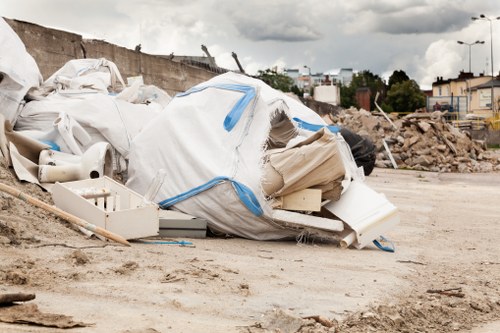Effective Waste Removal in Council Rubbish Collection
Introduction to Council Rubbish Collection

Waste removal is a crucial service provided by local councils to ensure communities remain clean and healthy. Effective waste removal in council rubbish collection not only supports environmental sustainability but also enhances the quality of life for residents.
Understanding the processes and services involved can help residents make informed decisions about waste disposal and recycling. This article delves into the various aspects of council rubbish collection, offering insights into best practices and the benefits of efficient waste management.
Whether you're a homeowner, business owner, or simply interested in environmental conservation, comprehending how your local council handles waste can contribute significantly to your community's well-being.
Types of Waste Managed by Councils

Local councils manage a wide range of waste types to ensure comprehensive coverage of waste removal services. These include:
- **Household Waste:** Everyday items like food scraps, packaging, and non-recyclable materials.
- **Recyclable Materials:** Paper, plastic, glass, and metals that can be processed and reused.
- **Hazardous Waste:** Items such as batteries, paints, and chemicals that require special handling.
- **Green Waste:** Organic materials like garden clippings and leaves.
- **Bulky Items:** Large items like furniture and appliances that need scheduled pick-ups.
By categorizing waste, councils can implement targeted strategies to reduce landfill usage and promote recycling and reuse.
Scheduling and Collection Services

Council rubbish collection typically follows a structured schedule to ensure regular and efficient waste removal. Services often include:
- Weekly Collection: Regular pick-ups of general household waste and recyclables.
- Bi-weekly or Monthly Collection: Scheduled removal of bulky items and special waste streams.
- On-demand Collection: Services available for urgent or unscheduled waste removal needs.
Residents are usually provided with specific guidelines on how to sort and place their waste to facilitate smooth collection processes.
Recycling and Sustainability Initiatives

Recycling plays a significant role in sustainable waste management. Councils implement various initiatives to encourage recycling, such as:
- Recycling Bins: Providing designated containers for different types of recyclables.
- Education Programs: Informing residents about what can be recycled and how to sort waste properly.
- Incentive Schemes: Rewards or discounts for households that actively participate in recycling programs.
These efforts not only reduce the volume of waste sent to landfills but also conserve natural resources and minimize environmental impact.
Challenges in Waste Removal

Despite the structured systems in place, councils face several challenges in waste removal:
- Population Growth: Increasing numbers of residents can strain existing waste management infrastructure.
- Illegal Dumping: Unauthorized disposal of waste undermines recycling efforts and clutters public spaces.
- Resource Allocation: Balancing budget constraints with the need for efficient waste collection services.
- Public Compliance: Ensuring residents adhere to waste sorting and disposal guidelines.
Addressing these challenges requires innovative solutions, community engagement, and continuous investment in waste management systems.
Technological Advancements in Waste Collection
The integration of technology in waste management has revolutionized how councils handle rubbish collection. Innovations include:
- Smart Bins: Equipped with sensors to monitor fill levels and optimize collection routes.
- Automated Sorting: Advanced machinery that can more efficiently separate recyclable materials.
- Data Analytics: Utilizing data to predict waste generation patterns and improve service delivery.
These technological advancements enhance the efficiency of waste removal processes, reduce operational costs, and promote better environmental outcomes.
Community Involvement and Education
Engaging the community is essential for successful waste removal in council rubbish collection. Key strategies include:
- Public Awareness Campaigns: Educating residents about the importance of proper waste disposal and recycling.
- Workshops and Seminars: Providing hands-on training on effective waste management practices.
- Feedback Mechanisms: Allowing residents to share their experiences and suggest improvements.
When communities are informed and involved, they are more likely to participate actively in waste management initiatives, leading to better overall results.
Environmental and Economic Benefits
Effective waste removal offers numerous environmental and economic benefits, such as:
- Reduced Landfill Use: Minimizing the reliance on landfills conserves land and lowers greenhouse gas emissions.
- Resource Conservation: Recycling and reusing materials reduce the need for raw resource extraction.
- Job Creation: The waste management sector creates employment opportunities in collection, sorting, and recycling industries.
- Cost Savings: Efficient waste management can lower municipal expenses and reduce costs for residents.
These benefits underscore the importance of investing in robust waste removal systems within local councils.
Future of Waste Removal in Councils
The future of waste removal in council rubbish collection is poised for further innovation and improvement. Potential developments include:
- Circular Economy Models: Emphasizing the reuse and recycling of materials to create a closed-loop system.
- Advanced Recycling Technologies: New methods to increase the efficiency and capacity of recycling processes.
- Policy Enhancements: Strengthening regulations to discourage waste generation and promote sustainable practices.
- Public-Private Partnerships: Collaborations between councils and private companies to enhance waste management services.
By embracing these advancements, councils can continue to improve waste removal services, benefiting both the environment and their communities.
Conclusion
Waste removal in council rubbish collection is a vital component of maintaining clean, sustainable, and healthy communities. Through efficient management, technological integration, and community involvement, councils can address the challenges of waste disposal and pave the way for a greener future.
Residents play a key role in this ecosystem by adhering to waste disposal guidelines and participating in recycling initiatives. Together, we can ensure that waste removal services remain effective and that our environment is preserved for future generations.
Contact us today to learn more about improving your local waste management practices and contributing to a sustainable community.